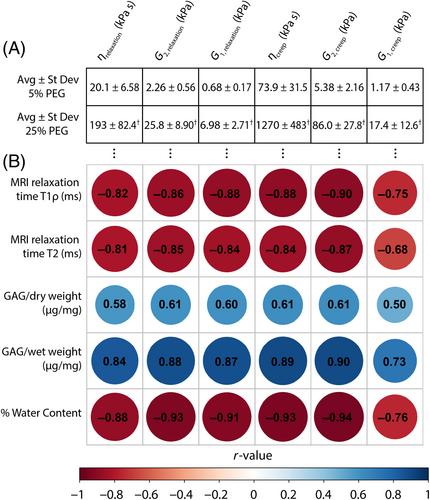Nucleus pulposus structure and function assessed in shear using magnetic resonance elastography, quantitative MRI, and rheometry
Abstract
Background
In vivo quantification of the structure–function relationship of the intervertebral disc (IVD) via quantitative MRI has the potential to aid objective stratification of disease and evaluation of restorative therapies. Magnetic resonance elastography (MRE) is an imaging technique that assesses tissue shear properties and combined with quantitative MRI metrics reflective of composition can inform structure–function of the IVD. The objectives of this study were to (1) compare MRE- and rheometry-derived shear modulus in agarose gels and nucleus pulposus (NP) tissue and (2) correlate MRE and rheological measures of NP tissue with composition and quantitative MRI.
Method
MRE and MRI assessment (i.e., T1ρ and T2 mapping) of agarose samples (2%, 3%, and 4% (w/v); n = 3–4/%) and of bovine caudal IVDs after equilibrium dialysis in 5% or 25% PEG (n = 13/PEG%) was conducted. Subsequently, agarose and NP tissue underwent torsional mechanical testing consisting of a frequency sweep from 1 to 100 Hz at a rotational strain of 0.05%. NP tissue was additionally evaluated under creep and stress relaxation conditions. Linear mixed-effects models and univariate regression analyses evaluated the effects of testing method, %agarose or %PEG, and frequency, as well as correlations between parameters.
Results
MRE- and rheometry-derived shear moduli were greater at 100 Hz than at 80 Hz in all agarose and NP tissue samples. Additionally, all samples with lower water content had higher complex shear moduli. There was a significant correlation between MRE- and rheometry-derived modulus values for homogenous agarose samples. T1ρ and T2 relaxation times for agarose and tissue were negatively correlated with complex shear modulus derived from both techniques. For NP tissue, shear modulus was positively correlated with GAG/wet-weight and negatively correlated with %water content.
Conclusion
This work demonstrates that MRE can assess hydration-induced changes in IVD shear properties and further highlights the structure–function relationship between composition and shear mechanical behaviors of NP tissue.


 求助内容:
求助内容: 应助结果提醒方式:
应助结果提醒方式:


